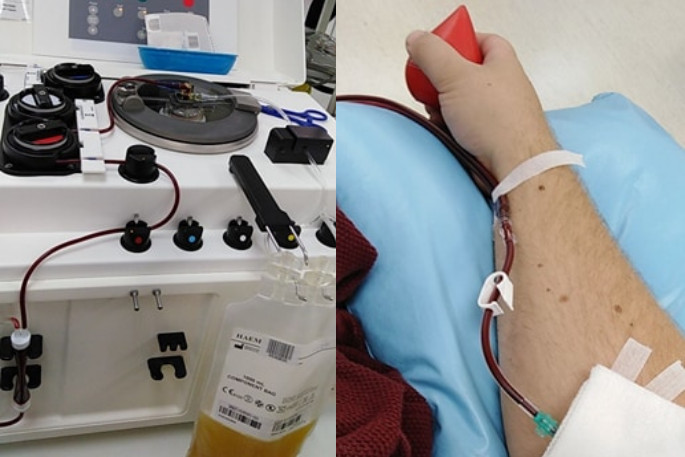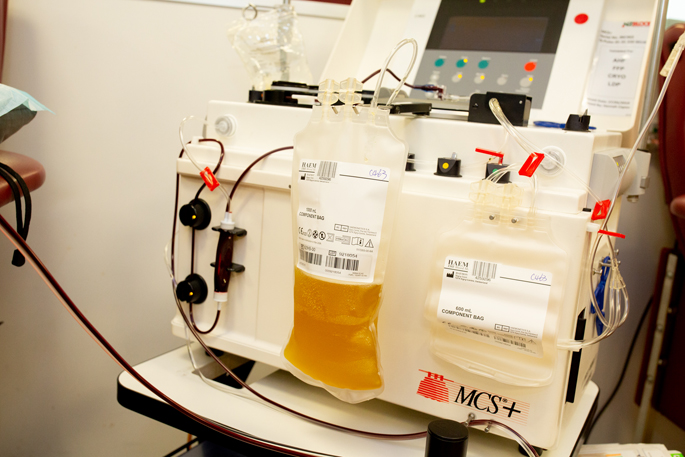New Zealand’s plasma supply is at a tipping point, as demand for this ‘liquid gold’ in our blood continues to increase by over 10 per cent year on year.
This National Blood Donor Week, New Zealand Blood Service is calling for New Zealander’s to “Be Golden” by becoming a plasma donor.
Currently in NZ, just 17,435 people are plasma donors.
Together they donated an amazing 94,000 units of plasma last year to help ensure the country could keep up with demand, but with plasma collection targets projected to grow by a staggering 50 per cent in the next three years, NZBS need more people to join their pool of plasma donors right now to help share the load and ensure they can meet future demand.
What is plasma?
Plasma is the golden coloured liquid component of our blood and a vital part of many people’s treatments for cancer, auto immune diseases and countless other conditions.
It can be turned into 11 lifesaving treatments, and used for more than 50 illnesses, as well as helping to treat burn victims, kidney and chemotherapy patients, people who’ve lost a lot of blood, or have recently had major surgery, and boost the immune system of people who cannot make antibodies of their own.
“We call plasma, “liquid gold,” says Josh Bankers, Acting CEO at New Zealand Blood Service.
“It’s the gold we all carry with us in our blood, and for thousands of New Zealanders it can mean the difference between life and death. We need more people to understand what plasma is, why it’s so important, and just how easy it is to donate.
“We need to collect just more than 2100 plasma donations every week to keep up with the current demand, but we’re falling short by about 250 donations every week.
“We’ve got an extremely loyal and active plasma donor database, but not everyone donates six-times a year or more, so we are now at the point where we need to increase the number of people who donate plasma. If we don’t, it is not enough for us to continue to meet demand into the future.
“In the next 12-months, we need 1500 more people to start donating plasma regularly. And by 2026 we are projecting we will need around 28,000 plasma donors in total to keep up with growth in demand.”
New Zealand is currently largely self-reliant for whole blood, plasma and platelets. Self-reliance from non-remunerated donors is considered the gold standard by the World Health Organization for blood services around the world.
 A plasma donation can take around 45 minutes. Supplied photo.
A plasma donation can take around 45 minutes. Supplied photo.
It means the country can meet the needs of its population for blood and blood products through voluntary donations made entirely from its whānau of lifesavers.
However, an increase in plasma demand is happening around the world, and if New Zealand is unable to meet demand locally, more plasma will need to be purchased on the global market.
NZ's size and geographical location together with availability and cost will make this extremely challenging.
“We’ve just come together as a nation and enjoyed two amazing weeks of Olympic action, but you don’t need to be a world-class athlete to bring home a gold for New Zealand,” Josh continues.
“The only training that is involved to be part of our lifesaving gold plasma team is staying well-hydrated, eating a healthy meal beforehand and about 45 mins of your time on a comfy chair on a regular basis throughout the year. People wanting to donate plasma do need to check their eligibility on our website by taking the eligibility quiz before they book.”
More about plasma can be found here.
Some quick facts.
- NZ currently has a total of 117,000 blood, plasma and platelet donors on its panel.
- Of that total panel only 17,435 are plasma donors.
- Less than 4% of the eligible population are donors in New Zealand.
- Every year around 30,000 people have their lives saved and improved by New Zealand donors.
- Following the recent lifting of the vCJD permanent deferral, people living in the UK, Republic or Ireland or France between 1980 and 1996 can now donate blood or plasma.
- NZBS needs to collect just over 2100 plasma donations every week to keep up with current demand, on average NZBS is short about 250 donations a week.
- You can donate plasma at a New Zealand Blood Service Donor Centres in Auckland, Hamilton, Tauranga, Palmerston North, Wellington, Christchurch and Dunedin.
- To help address demand, NZBS has increased the number of plasma beds across the country, brought in new plasma donation machines, lengthened opening hours and started mobile plasma drives in some urban areas.
- People wanting to donate need to check their eligibility here. A more detailed questionnaire will need to be completed at the donor centre when people arrive to donate.
- A plasma donation takes around 45 mins and is done via a process called apheresis. Red cells and platelets are return to the donor and only the plasma component is kept.
- You can donate plasma every two weeks.
To find a location to donate or book an appointment, download the NZ Blood App, visit nzblood.co.nz or call 0800 GIVE BLOOD (0800 448 325).



0 comments
Leave a Comment
You must be logged in to make a comment.